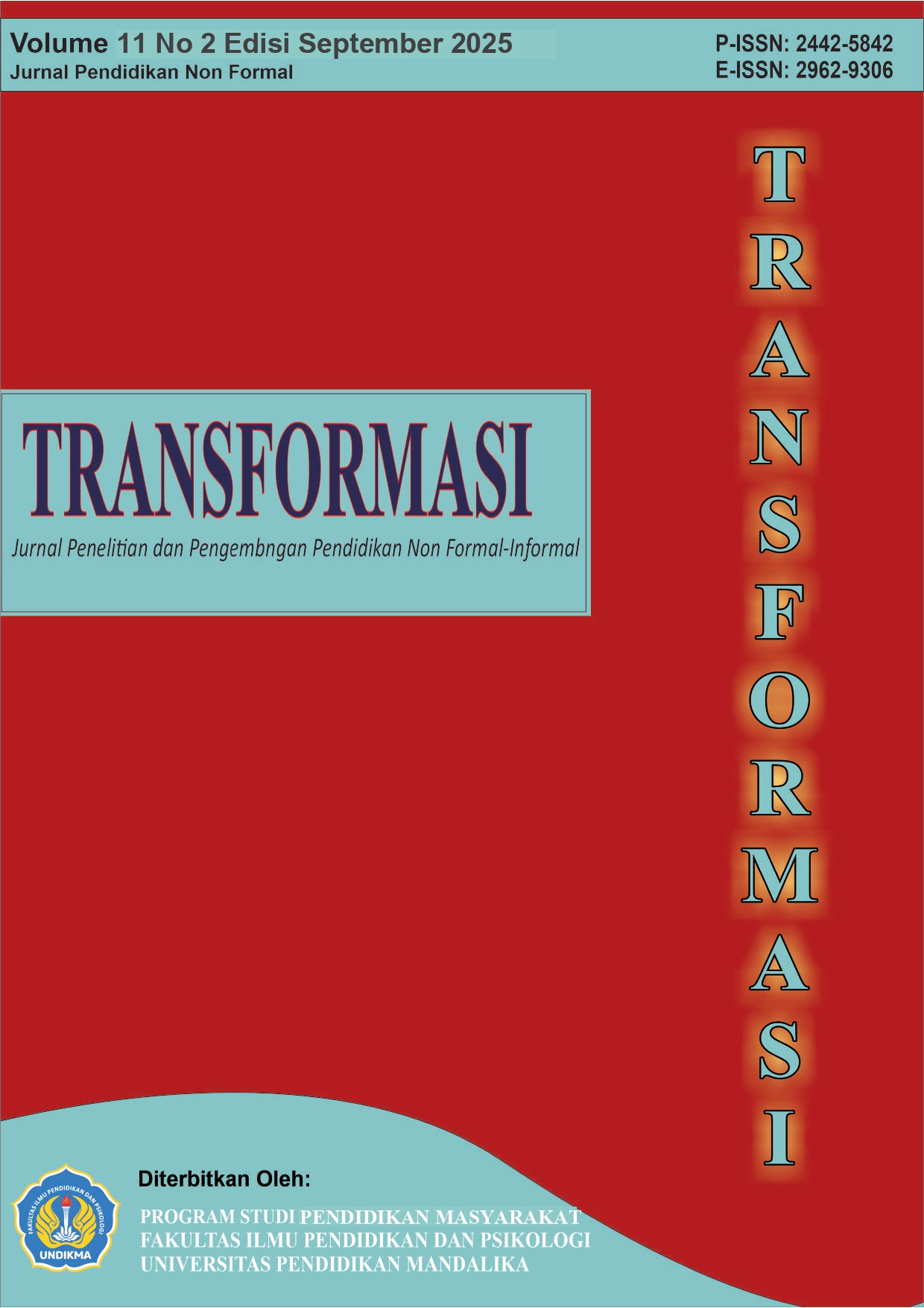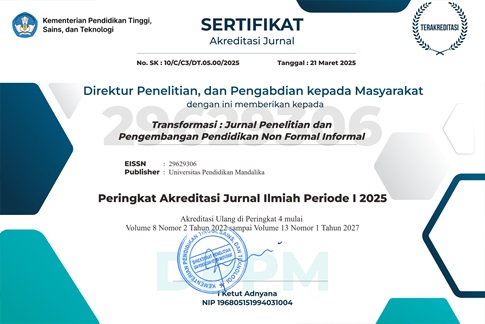Motivasi Dalam Layanan Bimbingan Seleksi CPNS dan PPPK: Studi Terhadap Peserta Bimbel Dewasa
DOI:
https://doi.org/10.33394/jtni.v11i2.17070Keywords:
Adult Motivation, Learning Center, CPNS, PPPK, Narrative , Motivasi Dewasa, Bimbingan Belajar, CPNS, PPPK, NaratifAbstract
Abstract. This study aims to understand how adult learners interpret their learning motivation while attending preparatory courses for CPNS and PPPK selection. Using a qualitative narrative approach, data were collected through in-depth interviews with three primary informants (with varied outcomes) and three supporting informants. Thematic analysis revealed that their motivation was not merely academic but rooted in existential processes, such as preserving self-worth, rebuilding hope, and resisting social pressure. The prep class was perceived as a safe space that provided new meaning to their struggles and personal identity. These findings extend the application of Self-Determination Theory by emphasizing that autonomy, competence, and social relatedness can emerge under non-ideal conditions through emotional support, personal reflection, and peer learning. This study contributes to educational psychology by highlighting the need for empathetic approaches in fostering adult learning motivation within nonformal education.
Abstrak. Penelitian ini bertujuan untuk memahami bagaimana peserta dewasa memaknai motivasi belajar mereka dalam mengikuti layanan bimbingan seleksi CPNS dan PPPK. Dengan menggunakan pendekatan kualitatif desain naratif, data diperoleh melalui wawancara mendalam terhadap tiga informan utama (dengan hasil yang beragam) dan tiga informan pendukung. Hasil analisis tematik menunjukkan bahwa motivasi peserta tidak sekadar bertujuan akademik, tetapi juga berakar pada proses eksistensial, seperti mempertahankan harga diri, membangun ulang harapan, dan melawan tekanan sosial. Bimbingan belajar dipandang sebagai ruang aman yang memberi makna baru terhadap perjuangan dan identitas diri. Temuan ini memperluas penerapan Self-Determination Theory dengan menekankan bahwa otonomi, kompetensi, dan keterhubungan sosial dapat tumbuh dalam kondisi tidak ideal melalui dukungan emosional, refleksi personal, dan komunitas belajar. Penelitian ini berkontribusi pada psikologi pendidikan dengan menegaskan perlunya pendekatan empatik dalam mendukung motivasi belajar peserta dewasa di Pendidikan nonformal.
References
Braun, V., & Clarke, V. (2022). Thematic analysis: A practical guide. SAGE Publications.
Clandinin, D. J., & Connelly, F. M. (2000). Narrative inquiry: Experience and story in qualitative research. Jossey-Bass.
Fleming, T. (2022). Mezirow’s theory of transformative learning and Freire’s pedagogy: Theories in dialogue. Adult Education Critical Issues, 2(1), 44–55. https://doi.org/10.12681/haea.32302
Kiger, M. E., & Varpio, L. (2020). Thematic analysis of qualitative data: AMEE Guide No. 131. Medical Teacher, 42(8), 846–854. https://doi.org/10.1080/0142159X.2020.1755030
Huda, A. H., & Warmi, A. (2022). Korelasi antara motivasi belajar dan hasil belajar matematika siswa kelas VIII. Edukatif: Jurnal Ilmu Pendidikan, 4(3), 4506–4514. https://doi.org/10.31004/edukatif.v4i3.2722
Lestari, E. D., & Fadhilah, F. (2021). Perbandingan motivasi belajar siswa antara belajar melalui bimbel tatap muka dan belajar melalui bimbel daring dengan aplikasi Ruang Guru SMA Negeri Kota Bengkulu. Consilia: Jurnal Bimbingan dan Konseling, 5(1), 89–98. https://doi.org/10.33369/consilia.5.1.89-98
McLeod, S. (2025). Maslow’s hierarchy of needs. Simply Psychology. http://dx.doi.org/10.5281/zenodo.15240896
Palinkas, L. A., Horwitz, S. M., Green, C. A., Wisdom, J. P., Duan, N., & Hoagwood, K. (2015). Purposeful sampling for qualitative data collection and analysis in mixed method implementation research. Administration and Policy in Mental Health and Mental Health Services Research, 42(5), 533–544. https://doi.org/10.1007/s10488-013-0528-y
Pratiwi, S. N., & Handayani, R. (2021). Peran motivasi sebagai mediator antara kesiapan belajar daring dan pengalaman belajar mahasiswa di masa pandemi COVID-19. Jurnal Psikologi Ulayat, 7(1), 45–60. https://doi.org/10.24854/jpu187
Ryan, R. M., & Deci, E. L. (2019). Brick by brick: The origins, development, and future of self-determination theory. Advances in Motivation Science, 6, 111–156. https://doi.org/10.1016/bs.adms.2019.01.001
Ryan, R. M., & Deci, E. L. (2020). Intrinsic and extrinsic motivation from a self-determination theory perspective. Contemporary Educational Psychology, 61, 101860. https://doi.org/10.1016/j.cedpsych.2020.101860
Santrock, J. W. (2020). Educational Psychology (7th ed.). McGraw-Hill Education.
Sinaga, Z. V., Abdillah, R., & Larasati, T. (2024). Peran Dukungan Sosial terhadap Motivasi Belajar Mahasiswa. Jurnal Psikologi, 1(4), 16–29. https://doi.org/10.47134/pjp.v1i4.2944
Surur, M. (2020). Peran Guru Bimbel dalam Pendidikan Karakter. Jurnal Administrasi Pendidikan, 20(2), 187–203. https://doi.org/10.35719/fenomena.v20i2.70
Vansteenkiste, M., Soenens, B., & Ryan, R. M. (2023). Basic Psychological Needs Theory: A Conceptual and Empirical Review of Key Criteria. In R. M. Ryan (Ed.), The Oxford Handbook of Self-Determination Theory. https://doi.org/10.1093/oxfordhb/9780197600047.013.5
Downloads
Published
How to Cite
Issue
Section
Citation Check
License
Copyright (c) 2025 Transformasi : Jurnal Penelitian dan Pengembangan Pendidikan Non Formal Informal

This work is licensed under a Creative Commons Attribution-ShareAlike 4.0 International License.
License Term
Â
This work is licensed under a Creative Commons Attribution-ShareAlike 4.0 International License.












